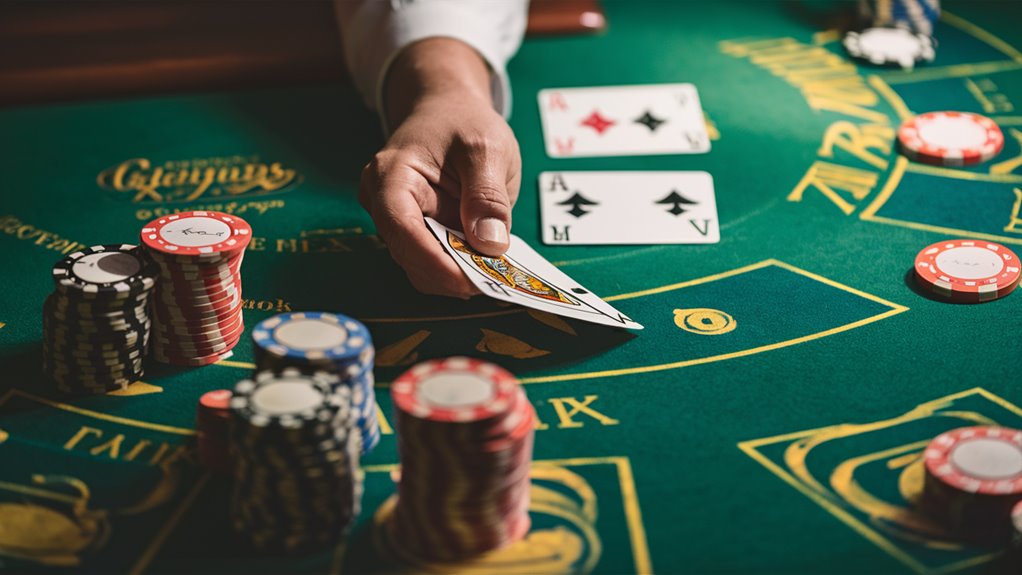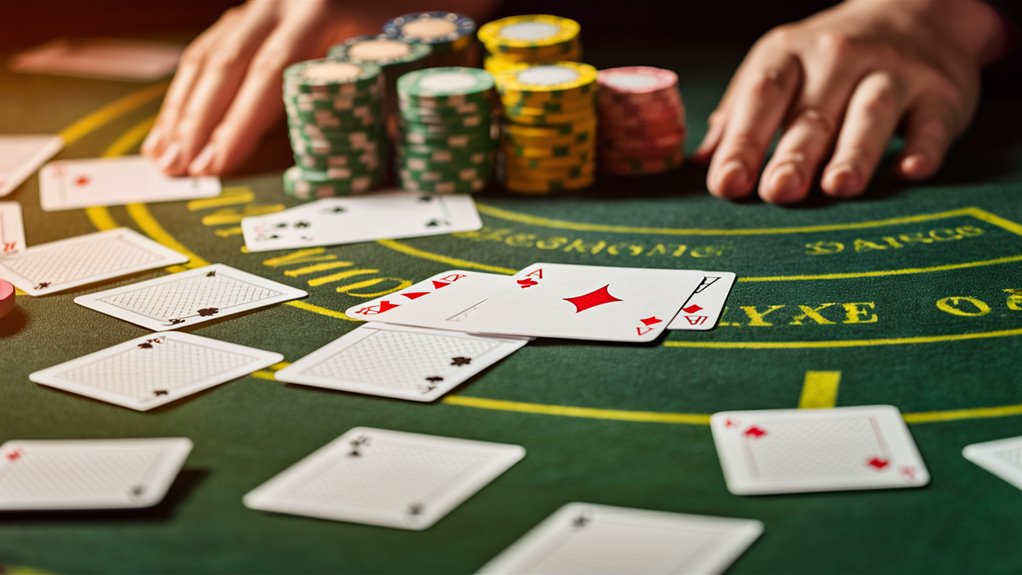Winning at Blackjack: Key Strategy Guide

Learning Basic Strategy Basics
Basic strategy is key for good play in blackjack. Knowing card values, hand signs, and math chances sets a strong base for winning often. Players should know the best moves for hitting, standing, splitting pairs, and doubling down based on their own cards and the dealer’s upcard. 더 많은 정보 보기
How to Act at the Table
Acting right at the table is key for long-term wins. Always stick to these rules:
- Do not touch cards in shoe-dealt games
- Keep hands out of betting circles once play starts
- Use clear signs for all choices
- Stay calm no matter what happens
Better Money Handling
Smart money handling keeps you playing longer. Use these tips:
- Bet 1% of your total money each time
- Set clear win/loss limits for each game
- Keep track of wins and losses
- Change bets as per your balance
Improving Your Skills
For serious growth, move past basic methods for better gains. Work on:
- Advanced counting ways
- Looking at deck makeup
- Finding good game setups
- Making hidden betting moves
True success comes from perfect basic strategy and adding more complex ideas slowly. Get good at one level before going to more hard skills. Sand-Like Reels Into Cyclonic Win Gusts
Key Blackjack Rules and Behavior Guide
Knowing How to Play
The main aim in blackjack is to beat the dealer’s hand without going over 21. Players get two cards face up, the dealer one up and one down.
Card values are easy: face cards are 10, aces are 1 or 11, and number cards hold their number.
Using Hand Signs Well
Right hand signs matter for game talking:
- Hit: Tap the table
- Stand: Wave hand over table
- Double Down: Put more chips by first bet
- Split Pairs: Place same bet next to first one
Acting Right at the Table
Good table behavior means following clear rules:
- Wait till hands end to buy chips
- Don’t touch face-up cards
- Keep off bets after game starts
- Put chips right in the circle
- Talk to dealer when not playing
How to Bet Right
Right betting ways need exact chip spots before cards out. Petal & Thorn Poker: Negotiating
Players should avoid touching bets when game’s on and use right circle for bets.
Right timing is key for splits and doubles, needing same chip amount by first one.
Important Blackjack Plan Charts Guide
Chart Basics
Blackjack charts give the math plan for good game moves, turning hard math figures into easy pictures.
These key tools show exact actions for each hand setup with the dealer’s face card.
Reading Charts Right
Use basic charts by finding your card total on the left side and the dealer’s top card on the top row.
The meet point shows the best math move, to hit, stand, double down, or split pairs.
Key Game Points
Main game rules everyone should know:
- Split Aces and Eights: Always split these for best win chances
- Never Split Fives or Tens: These are stronger as one hand
- Hard 12-16 vs. Dealer 7+: Hit when dealer has good cards
- Chance to Double Down: Best on strong first hands like 11, often 10 or 9
Hard and Soft Hands
Hard hands (no Ace as 11) follow easy rules.
Soft hands (Ace as 11) need their own plans as they can change a lot.
Using these set plays keeps the house’s edge low in all game times.
Getting Card Values in Blackjack

Basic Card Values
Number cards (2-10) keep their face value, the core of hand numbers in blackjack.
Face cards (Jack, Queen, and King) all have 10 points, same when getting hand totals.
The Ace stands out in blackjack, as 1 or 11 points, giving game choices.
Advanced Hand Numbers
Knowing hand total numbers means getting Ace’s two sides and picking the best based on the full hand and the dealer’s card. This changeable system is the heart of smart blackjack ways.
Soft vs Hard Hands
Soft hands have an Ace as 11, while hard hands don’t or have an Ace as 1.
For example, an Ace-7 is a soft 18, but get a 5, it turns to a hard 13 as the Ace shifts to 1 to avoid busting. Dawncrest Blackjack: Claiming
Knowing these hand changes helps players make the best moves and keep an edge in the game.
Key Money Handling for Blackjack Wins
Setting Your Base
Smart money handling is the base of winning at blackjack.
Make a clear play fund away from money for life needs.
Your bet unit should be 1% of all your money to keep play going long and max out table time.
Setting Wins/Losses
Clear win/loss lines help save your money.
Set firm win and loss points before starting. With a $1,000 money pile, make a strict $200 win/loss line. Hit it, and stop playing right away.
Tracking Plays and Tips
Systematic play tracking helps you get better with data. Write down these main points:
- First bet amount
- How long you play
- End results
- Big hand ends
This full track plan helps adjust strategies and finds what works while showing what needs work.
Running Sessions Right
Smart money split needs money set for each play part.
With a $1,000 total pile, keep risk per play to $200 max. This safe plan lets you handle ups and downs while keeping bets right over many games.
Risk Rules
- Don’t run after losses
- Keep bets the same size
- Skip big bet jumps in bad times
- Save money for later chances
- Stick hard to set limits
Key Blackjack Mistakes to Dodge: Expert Strategy Guide
Basic Play Mistakes
Missing basic strategy costs a lot in blackjack.
Players add to house edge when splitting 10s, taking bets they don’t need, or chasing losses.
These key slip-ups hit your win chances and money life hard.
Must-Do Strategic Moves
Smart splitting moves stick to tested math.
Never split 5s with a hard 10 – hitting bets better.
Split 4s only against dealer 5 or 6, and keep pairs of face cards as one.
Insurance bets work only in high counts with deck watching.
Picking Right Games and Play Chances
Picking games well changes long wins a lot.
Look for tables with 3:2 payouts on blackjack, good deck counts, and dealers who stand on soft 17.
Stay sharp by not playing when tired, upset, or under the weather.
Winning at blackjack needs full focus on basic strategy – guesses and feelings fall short against math plans.
Top Casino Game Skills and Systems
Smart Card Counting Ways
Card counting basics change the game with smart track plans.
The Hi-Lo counting way gives cards numbers: +1, 0, or -1.
Keeping a sharp running count and using the true count with left decks gives a math edge in choosing moves.
Better Tracking Moves
Shuffle tracking is a high skill for edge through pattern know-how.
This way checks card mixes in shuffle moves and spots card groups with high value.
Wins need deep looks at dealer shuffle ways and sharp track of good card spots, mostly those with lots of tens and aces.
Pro-Level Skills
Sharp card reading and hole-card tracking need good eye skills.
Players should see small dealer habits and card signs that might show good info.
Play changes based on card taken out need smart moves based on what you see.
These top methods need lots of practice and well-set hide plans to stay useful in real games.
